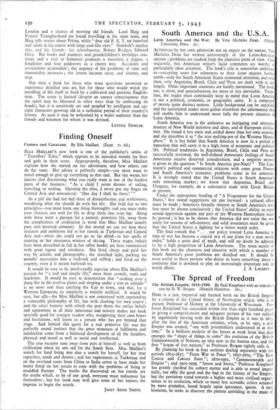Finding Oneself
Cruises and Caravans. By Ella Maillart. (Dent. 7s. 6d.)
ELLA MAILLART'S new book is one of the publisher's series of " Travellers' Tales," which appears to be intended mainly for boys and girls in their teens. Appropriately, therefore, Miss Maillart explains how she started on her adventures and how others can do the same. Her advice is perfectly simple—you must want to travel enough to give up everything to that end. But she warns her juniors that discovering what you really want is one of the hardest parts of the business: " As a child I never dreamt of sailing, travelling or writing. Opening the atlas, I never put my finger on Central Asia and announced: ' One day I shall be there! '"
As a girl she had her full share of dissatisfaction and restlessness, wondering what she should do with her life. . She held fast to two principles—you must learn one thing thoroughly 2nd you must make your chances, not wait for life to drop them into your lap. Along with these went a passion for a natural, primitive life, away from the complexities of civilisation (a word that Miss Maillart usually puts into inverted commas). In this record we can see how these instincts and ambitions led to her travels in Turkestan and Central Asia and—when she could not go so far- afield—to her spells of cruising or her strenuous winters of ski-ing. These stages (which have been described in full in her other books) are here summarised with great vigour and vividness. She lived cheap and paid her way by articles and photographs ; she travelled light, packing six months' necessities into a rucksack and sailbag ; and lived on the country, even if it meant buttered tea.
It would be easy to be intellectually superior about Ella Maillart's passion for " a real and simple life," away from crowds, roofs and machines. It would be easy to demonstrate that " cooking over a dung fire in the treeless plains and sleeping under a tent in solitude " is no more real than catching the 8.20 to town, and that, for a Western European, its simplicity is entirely artificial. It would be easy, but silly—for Miss Maillart is not concerned with expounding a vulnerable philosophy of life, but with charting her own course ; and the strict honesty with which she puts down her earlier beliefs and aspirations in all their innocence and naivety makes her book specially good for younger readers who, recognising their own hopes and hesitations, will listen to a person who has got beyond that stage. And behind this quest for a real primitive life was the perfectly sound instinct that the great moments of fulfilment and satisfaction come from a balanced development of all the faculties, physical and moral as well as social and intellectual.
The true escapist runs away from part of himself as well as from civilisation when he sets sail for the South Seas. Miss Maillart's search for hard living was also a search for herself, for her true capacities, needs and desires ; and her experiences in Turkestan and on the overland route from China to India seems to have made her better fitted on her return to cope with the problems of living in muddled Europe. The truths she discovered on her travels are the truths which, to be of any good, everyone must rediscover for themselves ; but her book may well give some of her juniors the impetus to begin the search.
JANET ADAM Shunt.


























 Previous page
Previous page